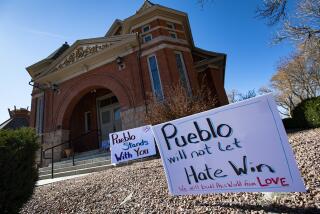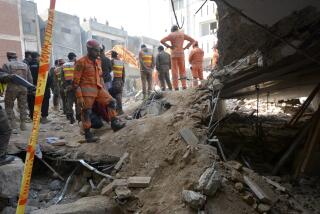Al Qaeda Gathering Strength in Pakistan
- Share via
WASHINGTON — Hundreds of Al Qaeda terrorist operatives are hiding in Pakistan’s cities after forming or renewing alliances with local Muslim extremist networks that have helped provide safe houses for communications, training and logistics, U.S. officials say.
The result, they fear, is that America’s closest ally in Central Asia has in effect replaced Afghanistan as a command-and-control center for at least some of the battered remnants of Osama bin Laden’s terrorist army.
“They don’t operate with impunity there like they did in Afghanistan,” a U.S. intelligence official said. “But they have lots of supporters, and it’s easy for them to blend in.”
A Justice Department official agreed, saying Al Qaeda members appear to have gone “wherever they want” in Pakistan’s teeming cities.
“They’re hiding in plain sight,” he said.
Brian Jenkins, a terrorism expert at the Rand Corp. think tank in Santa Monica, says Bin Laden might have viewed Pakistan as part of a “business continuity plan to ensure survival of leadership, financing, communications and so on” in case Al Qaeda lost its sanctuary in Afghanistan.
Authorities say that Al Qaeda has made similar efforts to regroup by merging with local Muslim extremist groups in Africa, the Middle East and Southeast Asia. These makeshift alliances are more decentralized than the network long directed by Bin Laden, officials say, and thus might be more difficult for outsiders to penetrate.
Since last fall, the United States and its allies say they have foiled more than a dozen terrorist plots around the world and arrested more than 2,400 suspects in nearly 90 countries.
But more than half of Al Qaeda’s known leaders remain at large, including several linked to the Sept. 11 assaults and other major attacks. Officials are especially eager to catch Khalid Shaikh Mohammed, an Al Qaeda operative linked to almost every attack against the United States since the bombing of the World Trade Center in 1993.
U.S. intelligence analysts still believe that Bin Laden and his top aides have found refuge somewhere along Pakistan’s long and lawless border with Afghanistan. Broad pockets of local sympathizers are said to exist in the semiautonomous tribal areas of Baluchistan and North-West Frontier Province.
But U.S. and Pakistani officials now estimate that hundreds more Al Qaeda and Taliban fighters who fled the war in Afghanistan have disappeared into Pakistan. Many are thought to have linked up with like-minded local groups opposed to secular Muslim regimes and to the Western powers that support them.
*
Backers Mount Attacks
Al Qaeda supporters appear to have been responsible for at least two suicide attacks on Westerners in Pakistani cities this year, U.S. officials say. Al Qaeda leaders and followers have been arrested or tracked in nearly every major Pakistani city, including Karachi in the south, Lahore and Faisalabad in the east, Peshawar in the west, and Rawalpindi and Islamabad, the capital, in the north.
In some cases, U.S. officials say, Pakistani militants and even some members of the government’s Inter-Services Intelligence agency, known as the ISI, have openly supported Al Qaeda and have used an informal underground railroad to help fleeing terrorists.
“The ISI is filled with extremists, and I don’t think they’re trying very hard to find these people,” said a recently retired U.S. counter-terrorism official who is familiar with the manhunt. “In fact, they’re actively trying to hide them.”
Another U.S. official downplayed ISI’s role, citing recent intelligence reports. But “that doesn’t rule out the possibility that there are still links between rogue elements of ISI and Al Qaeda,” he said.
Al Qaeda’s presence in Pakistan poses a growing danger and dilemma for both Washington and Islamabad.
Defense Secretary Donald H. Rumsfeld, who visited Pakistan last week, and other U.S. officials have offered strong public support for President Pervez Musharraf’s military regime, which has provided airstrips, bases, fuel, intelligence and other critical help to U.S. forces.
Privately, however, many U.S. officials are increasingly voicing concerns that Musharraf’s crackdown on local terrorist groups this year has largely failed. Several banned groups have morphed or spawned virulent offshoots that have launched several attacks against Westerners this year. Authorities haven’t solved Friday’s car bombing outside the U.S. Consulate in Karachi, which killed at least 11 Pakistanis and wounded dozens more. A previously unknown group has claimed responsibility, but U.S. officials said the FBI is investigating whether Al Qaeda might be linked to the attack.
U.S. intelligence officials now suspect that groups linked to Al Qaeda were responsible for a May 8 bus bombing in Karachi that killed 11 French engineers and a March 17 grenade attack in Islamabad that killed four Protestant International Church congregants, including a U.S. Embassy employee and her daughter.
The arrest last month of an American-born alleged Al Qaeda operative, Jose Padilla, after he flew to Chicago on what authorities called a scouting mission for a possible radioactive bomb attack, suggested just how widespread Al Qaeda may have become.
U.S. officials say that Padilla, who used the Muslim name Abdullah al Muhajir, studied bomb-making early this year at an Al Qaeda safe house in Lahore, met with senior Al Qaeda officials in March at another safe house in Karachi and traveled elsewhere in the country. Pakistani police arrested Padilla’s alleged accomplice in Rawalpindi.
Although Padilla’s role was not known at the time, U.S. and Pakistani officials raided the Lahore safe house where he had stayed as well as suspected Al Qaeda compounds in several other cities March 28. Abu Zubeida, Al Qaeda’s operations chief, and several of his senior aides were captured after a shootout that night at a house in Faisalabad.
US. authorities say Abu Zubeida approved Padilla’s proposed “dirty bomb” plot at a meeting in December in Afghanistan and later traveled with him in Pakistan. Abu Zubeida, U.S. officials say, had been responsible for rebuilding the Al Qaeda network inside Pakistan before his capture.
A senior intelligence official said Al Qaeda “already had a presence” in Pakistan “so they don’t require other groups” for operations.
“They have always had loose alliances with fellow travelers with similar goals and motives,” this official added. “The memberships are very loose. People go back and forth from one group to the other.”
*
Group’s Reach Spreads
Arrests elsewhere also point to the terrorist group’s spread. Saudi Arabia acknowledged Saturday that three men arrested in Morocco on suspicion of planning attacks on U.S. and British ships in the Strait of Gibraltar are Saudi citizens. Morocco said they claim to be Al Qaeda operatives. The attacks would have been similar to the suicide bombing of the U.S. destroyer Cole in Yemen--an operation also linked to Al Qaeda.
As for Pakistan, the State Department, in its annual report on global terrorism issued last month, said Islamabad had “rendered unprecedented levels of cooperation to support the war on terrorism.” The report noted that Islamabad broke ties with the Taliban regime in Afghanistan after Sept. 11, froze hundreds of thousands of dollars in suspected terrorist assets and moved to bring radical Muslim schools that served as “breeding grounds for terrorists” into the mainstream educational system.
Musharraf’s government also outlawed several terrorist groups and detained more than 2,000 domestic “extremists,” the report said. But most have now been released and might be active again.
Questions remain, the State Department warned, about whether “Musharraf’s ‘get tough’ policy with local militants and his stated pledge to oppose terrorism anywhere will be fully implemented and sustained.”
Part of the problem is Pakistan’s history of covert support and overt tolerance for Muslim extremist groups, starting with the Taliban.
Peter Tomsen, U.S. special envoy for Afghanistan from 1989 to 1992, said the ISI provided the “weapons, resources and intelligence” to the Taliban as the Islamic movement rose to power, and then was “intimately involved” as the Talibs forged ties with Al Qaeda.
On its other border, Pakistan provided similar support for years to Muslim zealots fighting to oust India from the disputed territory of Kashmir. Terrorist attacks against civilians in Kashmir and in India brought the two nuclear armed rivals to the brink of war in recent weeks, but the crisis eased after Musharraf moved to stop Pakistani militants from crossing into the Indian-held portion of Kashmir.
Until recently, however, little attention was paid to other Pakistani terrorist groups that share Bin Laden’s doctrinaire view of Islam and his hatred of the West. Many attended Al Qaeda training camps in Afghanistan, or received arms and other support from Bin Laden, even if they didn’t formally join Al Qaeda. The contacts apparently paid off after Sept. 11.
A Pakistani official said his government estimates that at least several hundred Al Qaeda fighters slipped into Pakistan’s 10 tribal territories--mostly in the so-called Pushtun Belt that runs from Quetta to north of Peshawar--last winter. But they were exposed to U.S. satellites and other forces in the open desert, he said, and the cities seemed far safer.
Many had money to buy vehicles, supplies and guides from local warlords, this official said. And many, he said, reached out to a broad underground network of Bin Laden sympathizers and “fellow travelers,” mostly urban Pakistani militants.
“The network is there. You have religious groups that were sanctioned for years that no one was shutting down and are operating freely,” the Pakistani official said. “They are providing them with sanctuary.... It is an ongoing problem. We are cracking down on them, but they are still out there.”
Two Pakistani groups in particular--Lashkar-e-Taiba and Jaish-e-Mohammed--have long espoused the jihad cause against non-Muslims. They now appear to have provided haven or other assistance to Al Qaeda terrorists, the official said.
Authorities say Lashkar-e-Taiba was affiliated with the safe house in Faisalabad where Abu Zubeida and his top aides were arrested. And Jaish-e-Mohammed was linked to the January kidnapping and, later, beheading of Wall Street Journal reporter Daniel Pearl in Karachi.
The State Department labeled both groups as foreign terrorist organizations in December, empowering Washington to freeze any of the groups’ assets in the United States and to urge other nations to block their funds.
*
‘Very Worrisome’ Trend
A former Clinton administration counter-terrorism official said Pakistan’s increasing tangle of terrorist groups and their spinoffs is “very worrisome.”
“The general turmoil has made it much more attractive for all jihadists in the region to go after American targets,” he said. The long-range danger is that local Muslim militants backed by Al Qaeda could destabilize Pakistan, overthrow the government and set a dangerous new course for the nation.
“It is entirely within the realms of possibility that Pakistan could end up with an Islamic leadership that is a lot less sympathetic to the United States,” he said.
Tashbih Sayyed, the Pakistani-born editor of Pakistan Today, published in Southern California, said the war in Afghanistan only “destroyed an outpost” of terrorism. “The main infrastructure remained intact,” he said. And Pakistan, he warned, “is kind of a meeting place now for all the radical forces in the world.”
More to Read
Sign up for Essential California
The most important California stories and recommendations in your inbox every morning.
You may occasionally receive promotional content from the Los Angeles Times.














